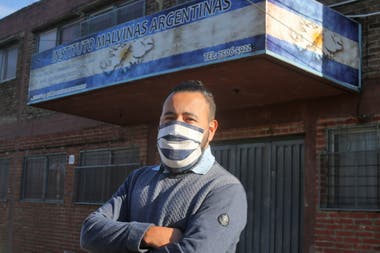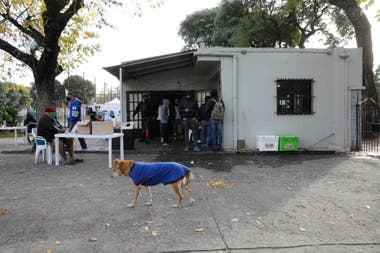Uncertainty rules our
future
: there is nothing to compare the current situation, nor do we know exactly when it will end or what the
Outcome
final. But on that blurred horizon-many times
overwhelming
And sad- there is a certainty: the shock that the pandemic caused by the Covid-19 is giving to the world ran us off our axis, took us out of the automatic routine and mobilized us. The unforeseen, the unpublished,
put white on black
to the present.
Inevitably, once overcome or already accustomed to the fears and tiredness of the confinement, the question arises as to how we are changing and what should we keep for the future.
We’re different?
Are we becoming a better, more empathetic, supportive society, more sensitive to the needs of others?
“Crises always lead to looking within, to
questions
and questions about the meaning of things and life. They expose
what things we really value
and which ones should we change, “explains sociologist Marita Carballo, president of Voices Research and Consultancy. Although she considers that” foreseeing the future is very difficult “, she maintains that” this situation generates a mixture of feelings and moods that make up an experience of life that will leave its mark on us and the next generations. ”
To dive into those learnings,
We invite readers of LA NACION
to tell what teachings and feelings are emerging in their lives with the pandemic. Most noted that they began to pay attention to little things, prioritize ties, and think more about others. In this sense, among the more than 100 responses received, the words that most identified the readers were
“gratitude”
(2. 3%),
“empathy”
(twenty-one%),
“anguish”
(17%) and
“solidarity”
(13%).
“We never had such a clear opportunity to
stop the ball
and see the direct consequences of our daily decisions and habits, “says Santiago Bilinkis, entrepreneur and technology specialist, who also, through his networks, was measuring what people thought about the changes caused by the arrival of the Covid-19. “Quarantine gave us a possibility of introspection to realize aspects of our
interior life
that they did not close us and that we can change from a difficult situation such as this, “says Bilinkis. From his gaze, this opens a door” so that the post-pandemic is not exactly the same as the madness in which we lived before. ”
Bilinkis finds an explanation for this phenomenon in science’s answer to how happiness works. “According to the Harvard study that I quote in
Guide to survive the present
,
The most important thing for long-term happiness is not the material circumstances of life but the quality and strength of ties.
that we establish with our loved ones, and the degree of community integration with which we live, “he says. Therefore, he points out that the abrupt fall from consumerism that the pandemic brought” made us, without realizing it, have to
run the emphasis of life from things to people
and that is better aligned with what makes us happy in the long run. ”
In that same tune are many of
the messages that came to the call made by LA NACION, where readers shared their experiences
: “I try to worry less about the future”; “I value family gatherings more”; “More closeness with others”; “That my affections are very important to my well-being”; “The material is ephemeral”; “Appreciate the little things, like meeting friends.” These are just
some of the phrases that they left but that give a new perspective
.
Beyond personal learning, Voices polls show that there is no consensus on how they can impact the future: while
out of every 10 Argentines five think that there will be important changes
and that it will be a practically new world after the crisis,
four consider that everything will be as before
of the pandemic.
In this sense, the sociologist explains that under normal circumstances large-scale changes usually occur through generational replacement, in a slow process, but that
a crisis of this magnitude could speed up the deadlines
. “We know that the moral values of people are formed in childhood and youth (up to approximately 25 years old) and that they tend to be quite stable throughout life,” says Carballo.
Bilinkis adds that “there are many aspects of life in which we are going to come out different and, in some sense, better, if we are able to take advantage of these learnings”.
Change priorities
The pandemic exposed the
strong inequalities
already present in Argentine society and how that impacts the way in which people go through and experience quarantine: a large part of the population cannot think about the post-pandemic, what to learn and how to improve, because – unfortunately – they are bound to see how they survive this situation, both from the health and the economic point of view.
In that sad scenario, once again
the solidarity response made itself felt
, as reflected in the messages received by LA NACION: “For the first time I think we all think of each other,” said reader Ammeris. “You have to have empathy with people who have a different reality than ours,” Ash added.
For Carballo, “that the fact affects everyone reinforces a sense of humanity in most people, which translates into greater solidarity and mutual aid. This is something very positive and that we must encourage.”
Despite not being able to leave their homes,
people mobilized
and put his gaze more on the other. There were those who prepared
viands
for those who had nothing to eat or donated hygiene kits. Also, there are many who said that they were more attentive to the older adults in their family or that they volunteered to assist them. Others
readers
They shared their experience of having collaborated with different charitable ventures or helped with what they knew how to do best. For example, Claudio said that he offers free assistance to those who need to update their CV: “It is a way to help with my knowledge,” he said.
In short, if it is about learning, these days quarantine is leaving many lessons that fill us with pride as a society and show us how much we have to improve. “We are facing a great opportunity to improve our social capital,” concludes the sociologist.
Illustration:
Javier Joaquín.
ALSO
.
Publicado en el diario La Nación




